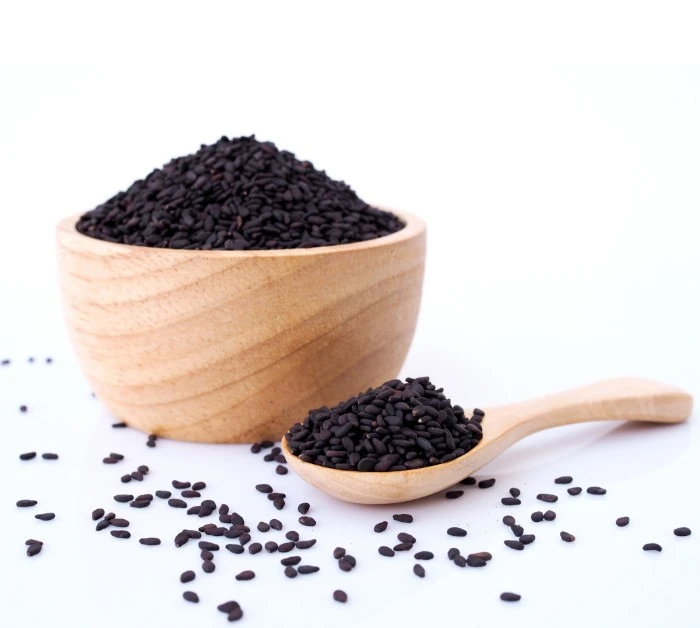Why are black sesame seeds good for you, and what are the best ways to use them in cooking?
In this article, we will discuss the benefits of black sesame seeds as well as how to incorporate them into your diet. You will also learn the difference between white and black sesame and when to avoid eating black sesame seeds.
Let’s start with some background information on black sesame seeds.
Sesame seeds are the world’s most popular and nutritious seeds. Sesame seeds come in a range of colors, including black, brown, tan, gray, gold, and white.
Black sesame seeds are small, flat, oily seeds that grow in the Sesamum indicum plant’s fruit pods. It is one of the world’s oldest cultivated plants, grown for both culinary and medicinal purposes.
Black sesame seeds have a slightly nuttier flavor than white sesame seeds, but there is more information about the difference between white and black sesame seeds further down in this article.
Now that we’ve covered the fundamentals of these seeds, let’s look at the benefits of black sesame seeds and why it’s a good idea to incorporate them into your diet.
This post may contain affiliate links, which means we may receive a small commission, at no cost to you, if you make a purchase through a link. For more information, please see our disclosure.
Black sesame seeds benefits
Highly nutritious seeds
According to the USDA, two tablespoons (14 grams) of black sesame seeds contain the following nutrients:
- Calories: 100
- Protein: 3 grams
- Carbs: 4 grams
- Fat: 9 grams
- Fiber: 2 grams
- Calcium: 18% of the Daily Value (DV)
- Copper: 83% DV
- Magnesium: 16% DV
- Iron: 15% DV
- Zinc: 9% DV
- Manganese: 22% DV
- Phosphorus: 11% DV
One of the many reasons why eating black sesame seeds is beneficial is that more than half of a sesame seed is made up of oil. Sesame seeds contain healthy monounsaturated and polyunsaturated fats.
Recent scientific evidence suggests that replacing foods high in saturated fats with foods high in unsaturated fats may reduce your risk of heart disease. Just two tablespoons of black sesame seeds contain 3 grams of monounsaturated fat, 4 grams of polyunsaturated fat, and only 1 gram of saturated fat.
Beneficial antioxidants
Antioxidants are essential in preventing or slowing down various types of cell damage in your body. Oxidative stress is one type of cellular damage that antioxidants are thought to protect against.
Long-term oxidative stress may be the cause of many chronic conditions, such as diabetes, heart disease, and the process of aging.
Fruits, vegetables, nuts, and whole grains are excellent sources of antioxidants. Furthermore, black and white sesame seeds contain antioxidants and beneficial plant chemicals.
Sesame’s antioxidant properties may be attributed to a class of compounds known as sesame lignans. These compounds contain two distinct components: sesamin and sesamolin.
In a 2019 study, the free radical scavenging activities of black and white sesame seeds were assessed. According to the findings of this study, black sesame seed by-products inhibited inflammatory compounds more effectively than white sesame seeds.
The same study’s authors concluded that black sesame seeds can also be used to protect against DNA damage. Sesame seeds contain vitamin E, which is an important antioxidant nutrient in addition to sesame lignans.
May improve digestion
Another additional benefit of incorporating black sesame seeds into your diet is that they are beneficial to your digestive system.
These seeds are high in fiber, with a 2-tablespoon serving providing 8 percent of the daily value.
Fiber is a component of food that the body cannot digest or absorb. It stays intact, adding bulk and drawing in water to your digested food, softening your stool and allowing it to pass smoothly through your stomach and colon, preventing constipation.
Additionally, the presence of unsaturated fatty acids in black seeds can lubricate the intestinal walls and aid in constipation.
Suitable for nursing mothers
Black sesame seeds should be included in the diet of nursing mothers because they help to increase the smooth supply of breast milk.
They are a good source of calcium, magnesium, iron, and copper, all of which are good for nursing mothers’ health.
Lowers cholesterol levels
Black sesame seeds are high in phytosterols. Phytosterols are plant sterols that have a similar structure to cholesterol.
The diets of our ancestors were high in phytosterols as well as fiber and plant protein.
There is mounting evidence that reintroducing phytosterol-rich plant foods (whole grains, nuts, seeds, and legumes) into the modern diet may improve cholesterol profiles and help reduce the risk of cardiovascular disease.
Phytosterols displace dietary cholesterol within the intestinal tract, reducing the stores of available and absorbable cholesterol.
Black seeds are also high in magnesium, which helps to lower blood pressure and thus keep the heart-healthy. Healthy blood pressure and cholesterol levels lead to healthier arteries and better heart health.
Good for healthier skin and hair
The benefits of black seeds for hair and skin are primarily associated with black seed oil.
Today, the black seed is most commonly used in cosmetics and hair care products. The oil extracted from these seeds has antioxidant properties that aid in the relief of skin inflammation.
Thymoquinone, an antioxidant and anti-inflammatory compound in the oil, fights bacteria and fungus-caused skin diseases.
This compound promotes hair growth and slows cell aging, thereby preventing hair thinning. It reduces hair loss caused by hair follicle inflammation.
Black seed oil is commonly added to shampoos, oils, and homemade hair care products because it improves the volume and texture of your hair and, with continued use, stops hair loss.
According to the Journal of Dermatology and Dermatologic Surgery, using a lotion containing 10% black seed oil reduced the incidence of acne after two months. Participants in the study reported a satisfaction rate of 67 percent.
How to use black sesame seeds
For centuries, Asian and Middle Eastern cuisines have used sesame seeds in both savory and sweet dishes. Black sesame seeds can be used for far more than just decoration.
These seeds can be easily sprinkled on salads, vegetables, rice and noodle dishes, and so on. They can also be used as a crunchy coating for fish or in baked goods.
Black sesame seeds are easily processed into milk or tahini paste, and black sesame seed oil can be used in the same way as any other oil.
They make excellent dessert ingredients. If you’ve never used black sesame in a dessert, here’s a list of 50+ of the best sesame recipes, and here you can learn how to make black sesame paste and powder, which can be used in a variety of Asian dishes, desserts, and baking.
You can purchase these seeds from Amazon here; we recommend these organic raw black sesame seeds, unhulled and non-GMO.
Unhulled seeds contain more fiber, and purchasing organic seeds ensures that pesticides are not present.
Concerns about sesame seed allergy
More than 300,000 Americans may be allergic to sesame seeds. Sesame allergy sufferers may experience a range of symptoms ranging from mild to severe.
Sesame allergy symptoms may include:
- nausea
- vomiting
- diarrhea
- pain in the abdomen
- hoarse voice
- itchiness in the throat or mouth
- redness in the face
- swelling
Anaphylaxis can occur in people who have a severe reaction to sesame. Anaphylaxis is a potentially fatal allergic reaction that necessitates immediate medical attention.
If you are allergic to sesame, avoid all sesame-containing foods. If you see one of the following names in the list of ingredients, it most likely contains sesame:
- Benne, benne seed and benniseed
- Gingelly and gingelly oil
- Seeds
- Sesamol and sesamolina
- Sesamum indicum
- Sim sim
- Til
Because current food labeling laws do not require them to list sesame specifically, some manufacturers may lump sesame under descriptions such as “other flavors.” This will be changed on January 1, 2023.
If you are allergic to nuts or other edible seeds, avoid consuming black sesame seeds or sesame-containing products.
Difference between white and black sesame seeds
Aside from color, white and black sesame seeds differ in several ways:
The tan, brownish hull of white sesame seeds is usually removed, revealing the off-white embryo within. The hulls of black sesame seeds are frequently intact.
It’s worth noting that some unhulled sesame seeds are still white, tan, or off-white in color, making them difficult to distinguish from hulled sesame seeds. So, the best way is to inspect the packing to see if the seeds are hulled or unhulled.
Aside from color, there is also a difference in taste. When compared to their sweeter white counterpart, black sesame seeds have a slightly nuttier, more bitter flavor.
When used in large quantities, the richer, more pungent earthiness of black sesame seeds emerges, making a significant difference in desserts and other dishes.
Furthermore, some emerging research suggests that the contents of beneficial plant chemicals, amino acid proteins, and antioxidants in white and black sesame seeds differ. These studies indicate that black sesame seeds contain more lignans and certain beneficial unsaturated fats.
Here is a simple explanation of the distinction between sesame seeds:
- Tan/brown – slightly nutty, mild, firm with no crunch.
- Pure white – softer, milder, sweeter, hulled.
- Black – crunchier, stronger, and nuttier flavor.
If you want to learn more about white sesame seeds, here is an interesting article about sesame seeds that discusses why sesame seeds are good for you and the best ways to eat them.

Final thoughts on the benefits of black sesame seeds and how to eat them
Black sesame seeds are beneficial to your health because they aid digestion, are high in nutrients, and are a good source of antioxidants.
Additionally, black sesame is beneficial to nursing mothers, may aid in cholesterol reduction, and is beneficial to your hair and skin.
To reap all of the benefits of black sesame seeds, use them in a variety of sweet and savory dishes. They can be used in desserts, salads, vegetables, rice, and noodle dishes, among other things.
Regardless of the benefits of black sesame, it is important to note that if you are allergic to nuts or other seeds, you should be aware of the sesame allergy.
If you have a sesame allergy, avoid all forms of black sesame seeds as well as products containing black sesame seeds. Before purchasing any food, always read the label carefully.




